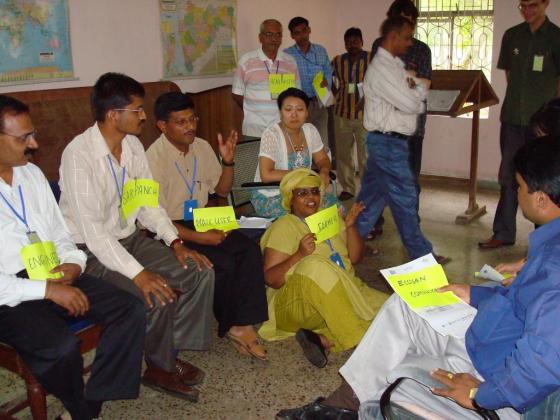Learning opportunities for adults exist in a variety of settings, ranging from a formal institution to day to day practical learning at work. It is important to acknowledge prior knowledge and experiences of learners, including their ability to recognize their own skills as lifelong learners. Considerations for adult development and learning include biological and psychological development and socio cultural and integrative perspectives on development. While the most common reason for adults to place themselves in a learning environment is a life-changing event, once in that environment there are many factors that affect the learning experience (MERRIAM and CAFFARELLA 1999).
Educators have historically supported the position that learning is a lifelong procedure, but few have acknowledged that learning is accomplished in different ways at various stages of life. Research indicates that a child seven years of age has a different learning pattern than a high school senior, or an adult. Until recently, however, the same principles of learning, or pedagogy, were applied to all learning situations regardless of the learner's maturity (RICHARDSON and PRICKETT 1994). Part of being an effective instructor involves understanding how adults learn best. Compared to children and teens, adults have different needs and requirements as learners.

Participants in an ecosan course in India perform a role play. While the “activist learner” can get a lot out of such exercises, “reflectors” prefer different learning environment. Source: Ecosan Services Foundation.
Compared to children, adults are more autonomous and self-directed. They need to be free to direct themselves. Facilitators must actively involve adult participants in the learning process. Specifically, they must get participant’s perspectives about what topics to cover and let them work on projects that reflect their interests. Facilitators must guide participants to their own knowledge rather than supplying them with facts (LIEB 1991).
Further, adults are more goal- and relevance-oriented than children. They must see a reason for learning something. Learning has to be applicable to their work or other responsibilities to be of value to them.
Adults are practical, focusing on the aspects of a lesson most useful to them in their work. They may not be interested in knowledge for its own sake (KNOWLES 1998).
Unlike children and teenagers, adults have many responsibilities that they must balance against the demands of learning. Because of these responsibilities, adults have barriers (lack of time, money, confidence, etc.) against participating in learning.
Despite this general common ground of adult learners, there are different ways how people learn. HONEY (1992), for instance, describes four main types of individuals: activists, reflectors, theorists and pragmatists.
Activists
Activists like to be involved in new experiences. They are open minded and enthusiastic about new ideas but get bored with implementation. They enjoy doing things and tend to act first and consider the implications afterwards. Activists like working with others but tent to hog the limelight.
| Activists learn best when | Activists learn less when |
|
|
Reflectors
Reflectors like to stand back and look a situation from different perspectives. They like to collect information and think about it carefully before coming to any conclusions. Reflectors enjoy observing others and will listen to their views before offering their own.
| Reflectors learn best when | Reflectors learn less when |
|
|
Theorists
Theorists adapt and integrate observations into complex and logically sound theories. They think problems through in a step-by-step way. They tend to perfectionists who like to fit things into a rational scheme. Theorists tend to be detached and analytical rather than subjective or emotive in their thinking.
| Theorists learn best when | Theorists learn less when |
|
|
Pragmatists
Pragmatists are keen to trying out. They want concepts that can be applied to their job. They tend to be impatient with lengthy discussions and are practical and down to earth.
| Pragmatists learn best when | Pragmatists learn less when |
|
|
Most of us have elements of more than one learning style. Knowing which your strongest and weakest styles are will help you identify how you best learn. As a trainer, having an appreciation of the different styles will help you to design stimulating and effective training sessions.
As a trainer, be aware of how of your own learning style may affect your choice of activity. Aim to appeal to all learning styles and pick a range of methods, not just those that you might naturally favour.
| ACTIVISTS are more likely to favour:
| THEORISTS you may more likely to favour:
|
| REFLECTORS ARE more likely to favour:
| PRAGMATISTS are more likely to favour:
|
Considering these differences, there is no “one fits all” approach for adult teaching. However, what can be said for sure is that all different types of learners will prefer an interesting mix of different learning methods over a series of monotonous lectures without any interaction.
Hence, understanding the adult learner is critical to the success of this learning approach. Adult learners need continual opportunities to identify their needs and recognise the relevance of their learning in terms of their own lives. Adult learners need self-directed learning opportunities in which they can actively participate (KROEHNERT 2007). They need to actively think, to do, and to reflect on experiences, to discuss with others, and to practice and learn new skills. The adult learner needs interactive communication with both the facilitator and fellow learners, which is different from one-way facilitator-to-learner communication. The learner needs to continually reassess the question, “Where am I now and where do I want to go?”
Understanding the adult learner is very important to give any successful training courses for adults. It is crucial that the trainers are aware about the different ways people learn and know how they can address these different learning needs.
Basic Training for Trainers
The Manual of Learning Styles
Learning in adulthood: A comprehensive guide
Recognizing How Adults Learn: Implications for Principals
Principles of Adult Learning
The website contains a brief discussion of the principles of adult learning, what motivates adult learners, and some tips to improve facilitation.
LIEB, S. (1991): Principles of Adult Learning. Arizona: South Mountain Community College from VISION URL [Accessed: 07.05.2012]Principles of Adult Learning
The website contains a brief discussion of the principles of adult learning, what motivates adult learners, and some tips to improve facilitation.
LIEB, S. (1991): Principles of Adult Learning. Arizona: South Mountain Community College from VISION URL [Accessed: 07.05.2012]How Adults Learn Facilitating Training
Describes learning activities which enhance adult learning and contains information on how to do effective learning that can facilitate attention, motivation, memory, and comprehension.
SALMAN, R. (2006): How Adults Learn Facilitating Training. In: Bahrain Medical Bulletin: Volume 28 , 2.The Learning Styles Quiz
http://tip.psychology.org/theories.html
Greg Kearsley’s website “Theory into Practice” is interesting for both beginners and general investigations and explains many different adult learning strategies.
http://internet.cybermesa.com/~bjackson/Papers/BillPage.htm
This site consists of an extensive series of papers on learning and human development by William H. Jackson.
http://adulted.about.com/?once=true&terms=adult+learning
About.com provides links to all sorts of adult learning and continuing education related information.
http://agelesslearner.com/intros/adultlearning.html
The site contains a list of books available in adult learning and some important web links on adult education.


